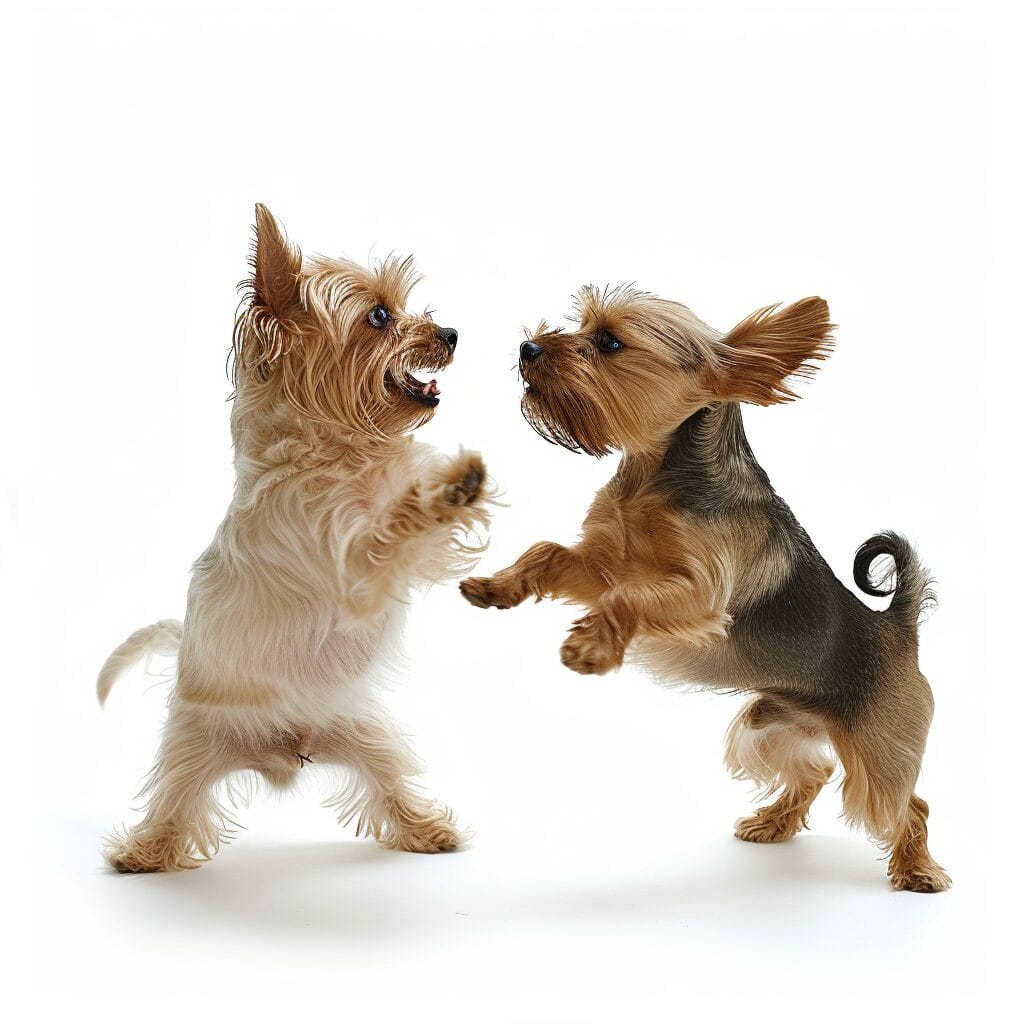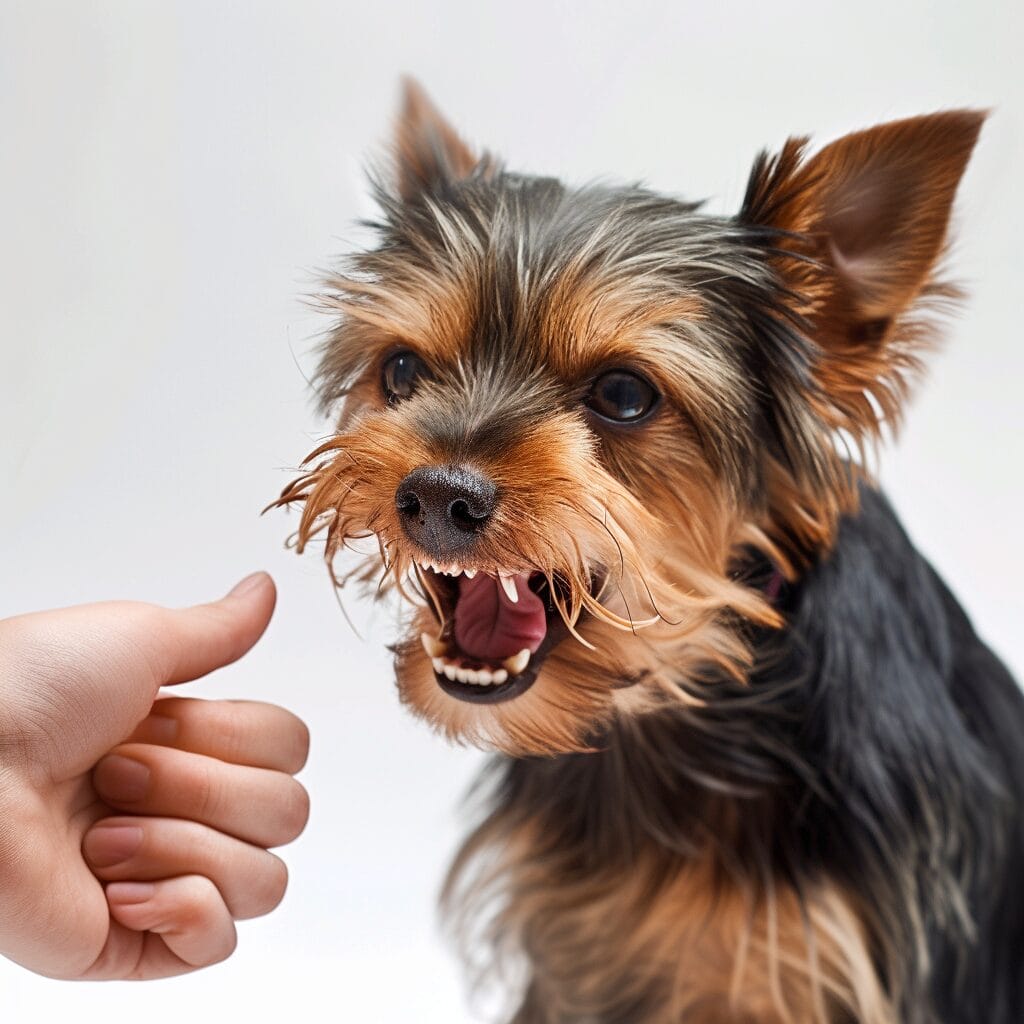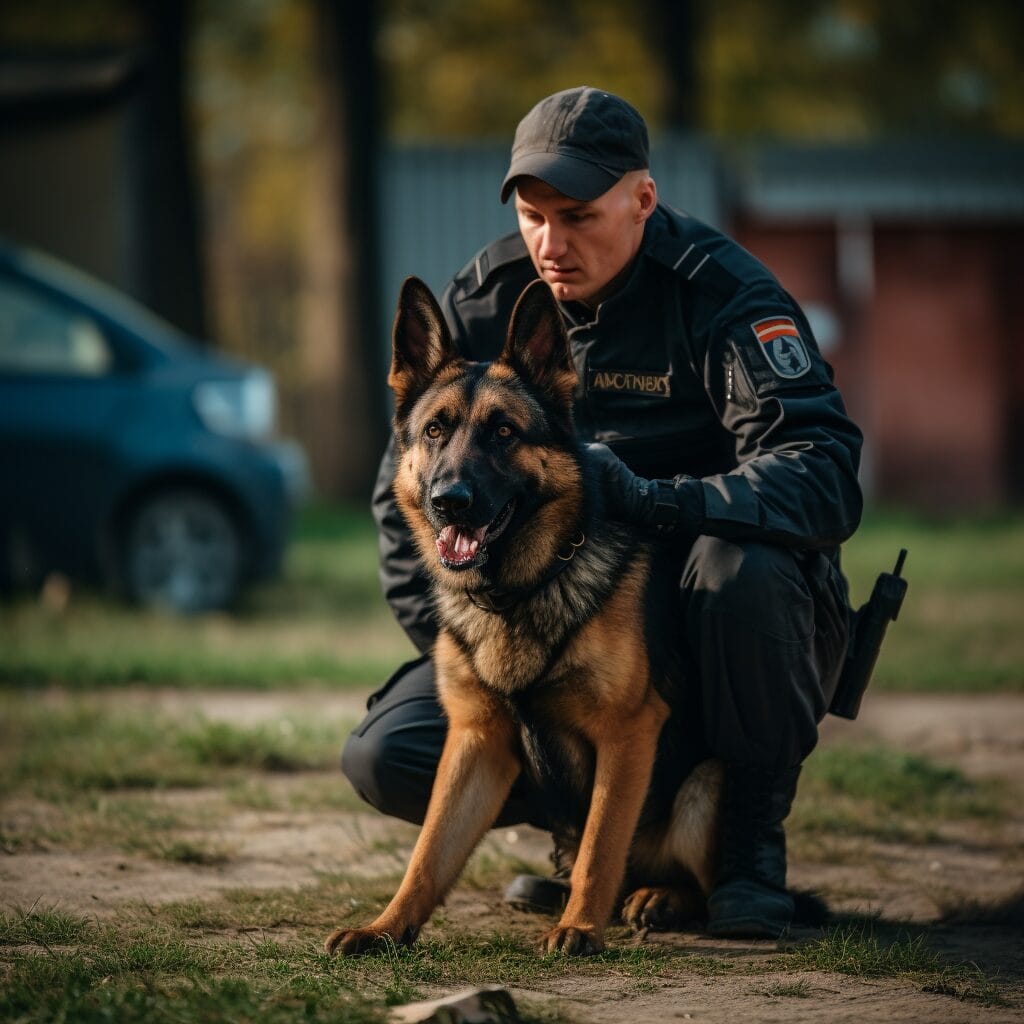Did you know that despite their small size, Yorkshire Terriers, or Yorkies, are known for their feisty and assertive nature? While these adorable small dogs may seem harmless at first glance, many people wonder if they have an aggressive side. In this post, we’ll delve into the common misconceptions about Yorkies’ temperament and explore the factors that can influence their behavior.
Understanding whether Yorkies are aggressive involves considering various aspects such as genetics, socialization, and training. We’ll uncover how dogs play a crucial role in shaping a Yorkie’s demeanor. We’ll provide insights into recognizing signs of aggression in Yorkies and offer practical tips on managing and preventing any potential aggressive behavior. By the end of this post, you’ll have a clearer understanding of whether Yorkies (dogs) truly possess an aggressive streak.
Are Yorkies Aggressive?
Understanding Aggressive Behavior in Yorkies

Fear and Anxiety
Aggressive behavior in dogs can often stem from fear or anxiety. When a Yorkshire Terrier feels threatened or scared, it may react aggressively as a defense mechanism. For example, if a Yorkie is approached by a stranger in an intimidating manner, it might respond with aggression out of fear.
Understanding the root cause of the aggressive behavior is crucial to effectively address and manage it. By identifying situations that trigger fear or anxiety in Yorkies or dogs, owners can take proactive measures to create a safe and comfortable environment for their pets.
Genetic Predisposition
In some cases, aggression in Yorkies may also be linked to genetic predisposition. Certain traits related to temperament and behavior can be inherited by these dogs from their ancestors. This genetic influence can manifest as aggressive tendencies in specific circumstances.
Despite this genetic component, proper training and socialization play significant roles in shaping a Yorkshire Terrier’s behavior. Through positive reinforcement techniques and exposure to various environments, owners can help mitigate any potential aggressive tendencies in dogs resulting from genetic factors.
Understanding the triggers for aggression in Yorkies is essential for managing their behavior effectively. Common triggers for dogs include unfamiliar people or animals encroaching on their territory, loud noises causing distress, or feeling cornered when restrained.
Identifying Causes of Aggressiveness in Yorkies

Health Issues
Health issues such as pain or discomfort can contribute to aggressiveness in Yorkies. When a Yorkshire Terrier experiences physical pain, they may become irritable and exhibit aggressive behavior. For example, dental problems, joint pain, or ear infections can cause discomfort, leading to aggression. It’s essential for pet owners to monitor their Yorkie’s health regularly and seek veterinary care if any signs of distress or uneasiness are observed.
Lack of proper socialization and training is another significant factor that can lead to aggressive behavior in Yorkies. Without sufficient exposure to different environments, people, and animals during their early development stages, Yorkies may struggle with fear or anxiety when faced with unfamiliar situations. This lack of socialization can result in defensive or reactive behaviors towards strangers or other pets.
Identifying Triggers
Identifying specific situations that trigger aggression is crucial for addressing the issue effectively. For instance, some Yorkies might display aggression when approached while eating food or chewing on a toy. Understanding these triggers allows pet owners to implement strategies to manage the situation proactively. By recognizing what provokes their dog’s aggressive responses, owners can take steps to create a safe environment and prevent potential confrontations.
It’s important for pet parents to pay close attention to their Yorkie’s body language and vocalizations when trying to identify triggers for aggressive behavior. Growling, baring teeth, raised fur along the back (hackles), and intense staring are all signs that indicate an imminent aggressive response from the dog. Once these triggers are recognized, pet owners should work with professional trainers or behaviorists who specialize in handling aggressive tendencies in small breeds like Yorkshire Terriers.
Training Techniques for Aggressive Yorkies

Positive Reinforcement
When dealing with aggressive Yorkies, it’s essential to use positive reinforcement training techniques. This means rewarding good behavior with treats or praise. For example, if your Yorkie remains calm when meeting new people or dogs, reward them immediately. This encourages the repetition of desirable behaviors.
Positive reinforcement helps train aggressive Yorkies by creating a positive association between good behavior and rewards. By consistently rewarding desired actions, such as obeying commands or refraining from aggressive behavior, you encourage your Yorkie to continue displaying these positive behaviors.
Consistency and Patience
Consistency is crucial when training an aggressive dog like a Yorkshire Terrier. It’s important to set clear rules and boundaries and stick to them every day. For instance, if jumping on guests is not allowed, ensure everyone in the household enforces this rule consistently.
Patience is also key when dealing with an aggressive Yorkie. Changing behavior takes time, so it’s important not to get frustrated or give up too quickly. With consistent training and patience, you can help your Yorkie understand what behaviors are acceptable and which ones are not.
Professional Help
Seeking professional assistance from a certified dog trainer may be beneficial for handling aggression in Yorkshire Terriers. A professional trainer has the knowledge and experience to assess your dog’s specific needs accurately.
A certified dog trainer can provide personalized guidance on how to address your individual dog’s aggressive tendencies effectively while considering their unique personality traits and triggers.
Managing Yorkie Aggression Towards Other Dogs

Socialization from an Early Age
Yorkies are known for their feisty nature, but proper socialization from an early age can significantly reduce aggression issues towards other dogs. By exposing your Yorkshire Terrier to various environments, people, and animals during puppyhood, you can help them become more comfortable and less reactive around other dogs. This exposure allows them to develop positive associations with different stimuli, making it less likely for them to exhibit aggressive behavior as they grow older.
Introducing your Yorkie to other well-behaved dogs in controlled settings is crucial. Positive experiences during these encounters can shape their behavior positively and reduce the likelihood of developing aggression towards other dogs. Using treats or toys as rewards when they display calm and friendly behavior around other dogs reinforces the idea that interacting with fellow canines is a pleasant experience.
Supervision and Redirection Techniques
When dealing with aggressive Yorkies, supervision plays a critical role in preventing altercations with other dogs. As a responsible dog owner, closely monitoring interactions between your Yorkie and other pets helps prevent potential conflicts from escalating into aggressive behavior. If you notice signs of tension or unease during interactions, swiftly redirecting your dog’s attention through commands like “sit” or “stay” can diffuse the situation before it escalates.
Redirecting focus onto positive activities such as playing with toys or engaging in obedience training also helps deter negative behaviors associated with aggression towards other dogs. By consistently reinforcing good conduct through redirection techniques, you instill discipline while simultaneously diverting their attention away from potential triggers that may lead to aggressive responses.
Addressing Yorkie Aggression Towards People

Obedience Training
Implementing obedience training is crucial in addressing aggression towards people in Yorkies. By teaching them basic commands such as “sit,” “stay,” and “come,” you can establish your role as the leader, helping to reduce aggressive behavior. Consistent training with positive reinforcement, such as treats and praise, can encourage good behavior and discourage aggression.
Obedience training also helps create a strong bond between you and your Yorkie. When they understand that you are the one providing guidance and care, they are less likely to exhibit aggressive tendencies towards people. For instance, if a Yorkie starts showing signs of aggression when someone approaches their food bowl or toys, obedience training can help them learn to share without feeling threatened.
Safe Environment
Creating a safe and positive environment is essential for managing aggression towards people in Yorkies. Providing a secure space where your pet feels comfortable can significantly reduce their anxiety levels which may contribute to aggression. Ensuring that there are no triggers for aggressive behavior within their environment minimizes the chances of confrontations with people.
For example, if your Yorkie displays signs of aggression when visitors come over, consider introducing them slowly to new guests while keeping them on a leash at first. This controlled introduction allows the dog to feel secure while preventing any potential negative interactions with unfamiliar individuals.
Understanding the underlying reasons for aggression towards people is crucial for effective intervention. It’s important to identify whether the aggression stems from fear, territoriality, possessiveness or lack of socialization early on so that appropriate measures can be taken.
Identifying these root causes enables owners to address specific issues through targeted interventions like desensitization exercises or counter-conditioning techniques tailored to each individual case.
Importance of Socialization and Training for Yorkies

Early Socialization
Early socialization is crucial in preventing aggressive behavior in Yorkies. Exposing them to various people, animals, and environments during their early developmental stages helps them become well-adjusted adults. By introducing your Yorkie to different experiences in a positive and controlled manner, you can reduce the likelihood of fear-based aggression later on.
Proper socialization involves exposing your Yorkie puppy to different sounds, sights, smells, and textures. It also includes interactions with other dogs and people. For example, taking your puppy to obedience classes or allowing them to play with other friendly dogs can help them learn appropriate social behaviors.
Socializing your Yorkie at an early age ensures that they develop confidence around new situations rather than resorting to defensive or aggressive behaviors when faced with unfamiliar stimuli.
Proper Training
Training provides mental stimulation for Yorkies while helping establish boundaries and expectations within the household. Consistent training sessions teach them how to behave appropriately in various situations, reducing the likelihood of displaying aggressive tendencies.
Educating your Yorkie about acceptable behavior through positive reinforcement techniques such as treats or praise reinforces good conduct while discouraging undesirable actions without instilling fear or anxiety.
For instance, teaching commands like “sit,” “stay,” “come,” and “leave it” not only fosters obedience but also promotes a strong bond between you and your pet. This bond further enhances their trust in you as their owner, reducing the potential for reactive or hostile conduct towards others.
Training also allows owners to address any signs of aggression promptly by redirecting negative behaviors into more constructive activities. Redirecting attention from threatening stimuli towards positive tasks helps prevent escalation into aggressive displays.
Dealing with Fear and Loneliness in Your Yorkie

Addressing Fear and Loneliness
Recognizing signs of fear and loneliness is crucial for addressing these emotions in your Yorkie. If your yorkie displays signs of fear or loneliness, it’s important to address these feelings promptly. Look out for behaviors such as excessive barking, hiding, trembling, or destructive behavior.
Providing a secure environment and positive experiences can alleviate fear-based aggression in Yorkies. Creating a safe space where your yorkie feels protected can help reduce their anxiety levels. Exposing them to positive experiences such as meeting new pet friends or playing with family members can help boost their confidence and diminish feelings of fear.
Companionship and Mental Stimulation
Addressing fear and loneliness through companionship and mental stimulation can reduce the likelihood of aggression in Yorkies. Spending quality time with your yorkie by engaging in interactive play sessions or going for walks together helps combat feelings of loneliness. Introducing another pet friend into the household can also provide companionship for your yorkie when family members are away.
Offering mental stimulation through toys that encourage problem-solving can keep your yorkie’s mind engaged, reducing stress levels associated with boredom or isolation. Providing scenarios where they have to figure out how to retrieve treats from puzzle toys not only keeps them mentally stimulated but also provides a sense of accomplishment.
Recognizing Signs of Pain or Discomfort in Yorkies

Behavioral Changes
Yorkies, like any other dog breed, may exhibit increased irritability when they are in pain or discomfort. This can manifest as aggression towards people or other pets. If your Yorkie is usually friendly but suddenly becomes snappy or starts growling, it could be a sign that something is bothering them. It’s crucial to pay attention to any shifts in their behavior and temperament.
It’s important to note that regular veterinary check-ups play a significant role in identifying underlying health issues that could cause aggression. Your veterinarian can assess your Yorkie’s overall health and well-being, which includes checking for any sources of pain or discomfort. By addressing these issues promptly, you can help prevent aggressive behavior stemming from physical ailments.
Physical Cues
In addition to observing changes in behavior, being attentive to physical cues can also aid in recognizing pain or discomfort in Yorkies. For instance, if your Yorkie is limping or showing reluctance to be touched on certain parts of their body, it might indicate an underlying issue causing them distress. Dogs communicate their discomfort through body language such as avoiding contact with the affected area.
Regularly examining your Yorkie for any signs of physical discomfort is essential for maintaining their well-being and preventing potential aggressive tendencies due to undiagnosed pain.
Steps to Reduce Aggression in Your Yorkie

Consistent Routine
Establishing a consistent routine for your Yorkie can significantly reduce aggression. Regular feeding, walking, and playtime create predictability, helping your pet feel secure and less anxious. For instance, feeding your Yorkie at the same times each day provides structure and stability, minimizing stress-related aggression.
A consistent routine also includes mental stimulation. Engaging activities like puzzle toys or training sessions keep your Yorkie’s mind active and prevent boredom, reducing the likelihood of aggressive behavior. By providing mental stimulation through interactive games or short training sessions throughout the day, you can effectively decrease instances of aggression in your pet.
Calm Environment
Creating a calm environment is crucial in minimizing aggression in Yorkies. Loud noises or chaotic surroundings can trigger anxiety and lead to aggressive responses. By maintaining a peaceful atmosphere at home, you help your Yorkie feel safe and relaxed.
Avoiding confrontational situations is equally important. For example, if your Yorkie displays signs of discomfort during interactions with other pets or people, it’s essential to remove them from such situations promptly. This prevents escalation of tension that could result in aggressive behavior.
Seeking professional guidance from a veterinarian or dog behaviorist is key when dealing with aggression in Yorkshire Terriers (Yorkies). A veterinarian can rule out any underlying medical conditions contributing to the aggression while offering tailored advice on managing behavioral issues specific to your pet’s needs.
A dog behaviorist specializes in understanding canine behaviors and can provide expert strategies for addressing aggression based on individual assessments of temperament and triggers unique to each dog breed.
Conclusion
Understanding aggressive behavior in Yorkies is crucial for addressing and managing their aggressiveness. Identifying the causes, implementing effective training techniques, and focusing on socialization are essential steps in reducing aggression in your Yorkie. Recognizing signs of pain or discomfort and addressing fear and loneliness play a significant role in managing their behavior. By taking proactive measures and understanding the underlying reasons for aggression, you can create a safe and harmonious environment for your beloved pet.
Now that you have gained insights into handling aggression in Yorkies, it’s time to apply these strategies and techniques to foster a positive and well-balanced relationship with your furry companion. Remember, patience, consistency, and empathy are key when working with an aggressive Yorkie. By investing time and effort into their training and well-being, you can help your Yorkie become a happier and more sociable member of your family.
Frequently Asked Questions
Are Yorkies naturally aggressive dogs?
No, Yorkies are not naturally aggressive. Their behavior is often influenced by their environment, socialization, and training. Proper care and positive reinforcement can help prevent or reduce aggression in Yorkies.
How can I identify the causes of aggressiveness in my Yorkie?
Observing your Yorkie’s body language and behavior can provide clues to the root cause of their aggression. Factors such as fear, pain, lack of socialization, or past experiences could contribute to their aggressiveness.
What training techniques are effective for dealing with aggressive Yorkies?
Positive reinforcement methods such as reward-based training and consistency in commands can be effective for managing aggression in Yorkies. Seeking professional guidance from a certified dog trainer experienced with small breeds like Yorkies is also beneficial.
How should I manage my Yorkshire Terrier’s aggression towards other dogs?
Gradual exposure to other dogs in controlled environments combined with positive reinforcement can help manage your Yorkshire Terrier’s aggression towards other dogs. It’s important to monitor interactions closely and intervene if necessary.
What steps can I take to reduce aggression in my Yorkshire Terrier?
Consistent socialization, proper training techniques, addressing any underlying health issues or discomfort, and creating a calm environment at home are key steps to reducing aggression in your Yorkshire Terrier.








